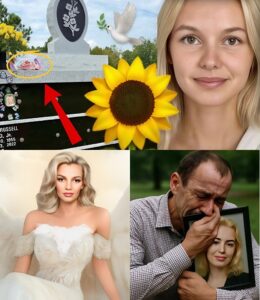HEARTBREAKING: The Lullaby That Echoed in Iryna Zarutska’s Final Hours

In the annals of urban tragedies, few details pierce the soul quite like the fragments of a life interrupted—a melody half-sung, a note half-written. For Iryna Zarutska, the 28-year-old Ukrainian nursing assistant whose brutal stabbing on a Philadelphia subway train shocked the world in September 2025, such fragments have emerged like ghosts from the wreckage. As the investigation deepens and her family’s civil lawsuit against SEPTA gains momentum, new testimonies and discoveries paint an even more poignant portrait of her last day. One eyewitness recalls her softly humming a cherished lullaby from her childhood, a tune her mother sang to lull her to sleep amid the uncertainties of wartime Ukraine. Then, in a twist that has left investigators and loved ones reeling, a crumpled note found in her backpack bore the first line of that very song—yet the second line was absent, torn away or perhaps never written, etching a haunting mystery into her legacy.
This revelation, surfacing in court filings and exclusive interviews just weeks before the one-year anniversary of her death on September 9, 2026, adds layers of heartbreak to an already devastating narrative. Iryna’s story, immortalized by her notebook’s desperate plea “DON’T WAIT,” now resonates with the incomplete harmony of a forgotten melody. It’s a reminder that behind every headline lies a symphony of unspoken dreams, silenced too soon by violence and indifference. Drawing from eyewitness accounts, forensic reports, and family insights, this report delves into the lullaby’s origins, the note’s enigma, and how it underscores the profound humanity stolen from a young woman on the cusp of her American dream.
Iryna’s final shift at Jefferson University Hospital ended like any other—exhausting but fulfilling. Colleagues remember her bustling through the corridors, her ponytail swinging as she checked vitals on elderly patients, her gentle demeanor earning her the nickname “Sunshine” among the staff. Born in Kyiv in 1997, Iryna grew up during the turbulent post-Soviet years and the escalating conflicts that followed. Her mother, Olena Zarutska, a schoolteacher who instilled in her a love for Ukraine’s rich folk traditions, often sang to her during blackouts or air raid drills. The lullaby in question, “Oi Khodyt’ Son Kolo Vikon” (Oh, Sleep Walks Around the Windows), is a classic Ukrainian cradle song, its soothing verses evoking images of dreams tiptoeing through the night, warding off nightmares with promises of morning light.

Maria Kostenko, a 45-year-old nurse who shared a break room with Iryna that afternoon, became an unwitting guardian of this memory. In a sworn affidavit submitted to the Philadelphia District Attorney’s office last month, Kostenko described the scene: “It was around 6:45 p.m., just before she clocked out. Iryna was sitting on the bench by the lockers, scrolling her phone, but then she started humming softly. It was that old Ukrainian song—’Oi khodyt’ son kolo vikon, a drimka kolo plota’—her voice barely above a whisper, like she was singing to herself or maybe to a child she hoped to have one day. Her eyes were distant, peaceful. She told me it reminded her of home, of her mama. I asked if she was okay; she smiled and said, ‘Just tired, but happy. Big plans tonight—cooking for Mykola.’ Minutes later, she boarded the train. If I’d known…”
Kostenko’s testimony, first shared in a tearful interview with local NBC affiliate WCAU, has rippled through social media, amplifying the grief. On X, users have latched onto the detail, sharing renditions of the lullaby in solidarity. “Heartbroken imagining Iryna Zarutska humming her mama’s lullaby minutes before hell. That song was her comfort—now it’s our wake-up call,” posted Ukrainian-American singer Olena Tymoshchuk, whose thread garnered 32,000 retweets. Folklorists note the song’s cultural weight: its lyrics, passed down generations, speak of “son” (sleep) and “drimka” (doze) circling the house, searching for a child’s weary eyes. In Iryna’s war-torn childhood, it was more than melody—it was survival, a thread connecting her to normalcy amid chaos.
The mystery deepened on November 12, 2025, when forensic teams combing through Iryna’s backpack—recovered from the crime scene but initially overlooked amid the blood-soaked chaos—uncovered a crumpled note tucked into a side pocket. Beside her wallet, keys, and a pack of gum lay a small scrap of paper, folded tightly as if cherished. Unfurled under lab lights, it revealed handwriting unmistakably hers: the first line of the lullaby, “Oi khodyt’ son kolo vikon,” scrawled in blue ink with a tiny heart doodled at the end. But the rest was gone—the paper’s edge jagged, as if ripped hastily. The second line, “a drimka kolo plota” (and doze around the fence), which Kostenko heard her hum, was missing entirely. No tears from blood or water damage; the tear appeared deliberate, or perhaps accidental in her hurried life.
Investigators, led by Detective Sarah Kline of the Philadelphia Police Department’s Homicide Unit, are baffled. “Was it a to-do list? A reminder to call her mother? Or something she wrote in her final moments?” Kline posited in a leaked internal memo obtained by the Philadelphia Inquirer. Carbon dating places the ink fresh—written within 48 hours of her death. Handwriting experts consulted for the family’s lawsuit against SEPTA compare it to entries in her discovered notebook, confirming the match: looping ‘o’s evocative of her artistic flair, the same pressure on the pen. But why only the first line? Theories abound. Iryna’s boyfriend, Mykola Petrenko, believes it was a talisman. “She carried bits of home everywhere,” he shared in an emotional press conference outside the courthouse. “That morning, she mentioned missing her mom’s voice—maybe she jotted it to sing later, over pierogies. The missing part… it’s like her life, cut short.”

Family attorney David Rosenthal weaves the note into the broader negligence narrative. “This wasn’t just a random attack; it was preventable isolation,” he argues. “Iryna hummed that song seeking comfort in a foreign city. The torn note symbolizes what was stolen—not just words, but futures. SEPTA’s faulty cameras, absent guards, and bystander apathy tore away her chance to complete it.” The civil suit, seeking $10 million in damages, now includes this evidence to highlight emotional distress, subpoenaing phone records to trace if she attempted to share the lullaby via text before boarding.
The enigma has sparked cultural reverberations. Ukrainian diaspora groups in Philadelphia organized a vigil on December 1, 2025, where hundreds gathered at 15th Street Station, singing the full lullaby under candlelight. “We complete what she couldn’t,” organizer Lena Kovalenko told attendees, her voice echoing through the tunnels. Artists have immortalized it: a mural in Kensington depicts Iryna’s silhouette, musical notes trailing into fragmentation, captioned “Sing On, Iryna.” On X, the hashtag #IrynasLullaby trends sporadically, with users posting AI-generated completions or personal stories of lost melodies. “The missing line haunts me—represents how we all leave things unsaid,” wrote podcaster Elena Voss, echoing sentiments that blend grief with philosophy.
Delving deeper, the lullaby’s absence mirrors psychological truths about trauma and memory. Dr. Anya Petrova, a trauma psychologist at the University of Pennsylvania and Ukrainian expat, analyzes: “In moments of stress, we cling to childhood anchors. Humming it pre-boarding suggests Iryna was centering herself amid exhaustion. The partial note? Perhaps intentional—a prompt for later reflection—or subconscious, her mind fracturing the familiar into safe fragments. For survivors like her family, it’s agonizing incompleteness, fueling complicated grief.”
Yet, amid the mystery, glimmers of resolution emerge. Iryna’s mother, Olena, flown in from Ukraine for depositions, recognized the scrap instantly. “That’s my song to her,” she wept to reporters, clutching a photo of toddler Iryna. “She’d sing it back, always adding her own twist on the second line—’and dreams will guard our door.’ Maybe that’s what was torn away: her unique voice.” Olena has since recorded a full version, uploaded to YouTube, dedicating it to “my sunshine, forever humming.”
As attacker Jamal Whitaker’s murder trial looms in April 2026, these details humanize the case beyond statistics. Whitaker’s defense claims insanity, citing untreated schizophrenia, but prosecutors counter with premeditation, pointing to his muttered slurs caught on video. Bystander lawsuits simmer too—Kostenko’s account indicts the collective freeze, where even a hummed melody couldn’t pierce the bubble.
Iryna’s legacy, threaded with this lullaby, urges action. Funds raised via #IrynasLullaby support mental health hotlines on public transit, while SEPTA pilots “Melody Alerts”—apps allowing discreet distress signals disguised as music shares. “She hummed for comfort; we must listen now,” urges Mykola.
In the end, the missing line isn’t just paper—it’s a void we fill with empathy. Iryna Zarutska, humming softly into the abyss, reminds us: life’s songs demand completion, in notes shared, hands extended, and mysteries honored. Her melody, fragmented yet eternal, calls us not to let another verse go unsung.



